from Apr. 17, 1865
State of Kentucky
-
Full Title
State of Kentucky
-
Description
Governor Thomas E. Bramlette reacts to the news of Abraham Lincoln's assassination. He also proclaims a day of mourning on April 19th at 12 o'clock for the entire state of Kentucky.
-
Transcription
State of Kentucky
Executive Department
Frankfort, April 17, 1865
By the hand of an assassin a great grief has been brought upon our country. The Chief Magistrate of the Nation, the President of the United States, ABRAHAM LINCOLN, had fallen a victim to rebellious hate under the vengeful blow of an assassin. He has fallen at a time when his great qualities of humanity were so hopefully invoked for the healing of our National woes! With no stain of vindictive nature upon his soul - with a great heart of generous sympathies and broad humanities - his untimely fall has bowed a Nation's head in mourning.
On WEDNESDAY, the 19th inst., at the hour of 12 o'clock, A.M. (the hour of his funeral), let every church bell be tolled throughout the Commonwealth; and on that day let all business be suspended, and all business houses be closed, the public offices closed, and draped in mourning.
The citizens of Kentucky are invoked to pay that homage to the National grief which such a great calamity inspires.
THOS. E. BRAMLETTE, Governor of Kentucky. -
Source
U.S. National Archives, General Records of the Department of Justice
-
Rights
This item is in the public domain and may be reproduced and used for any purpose, including research, teaching, private study, publication, broadcast or commercial use, with proper citation and attribution.
-
Tags
-
Cite this Item
Thomas E. Bramlette. "State of Kentucky". Remembering Lincoln. Web. Accessed July 16, 2025. https://rememberinglincoln.fords.org/node/1200
-
Creator
Thomas E. Bramlette
-
Date
April 17, 1865
from Apr. 17, 1865
State of Kentucky
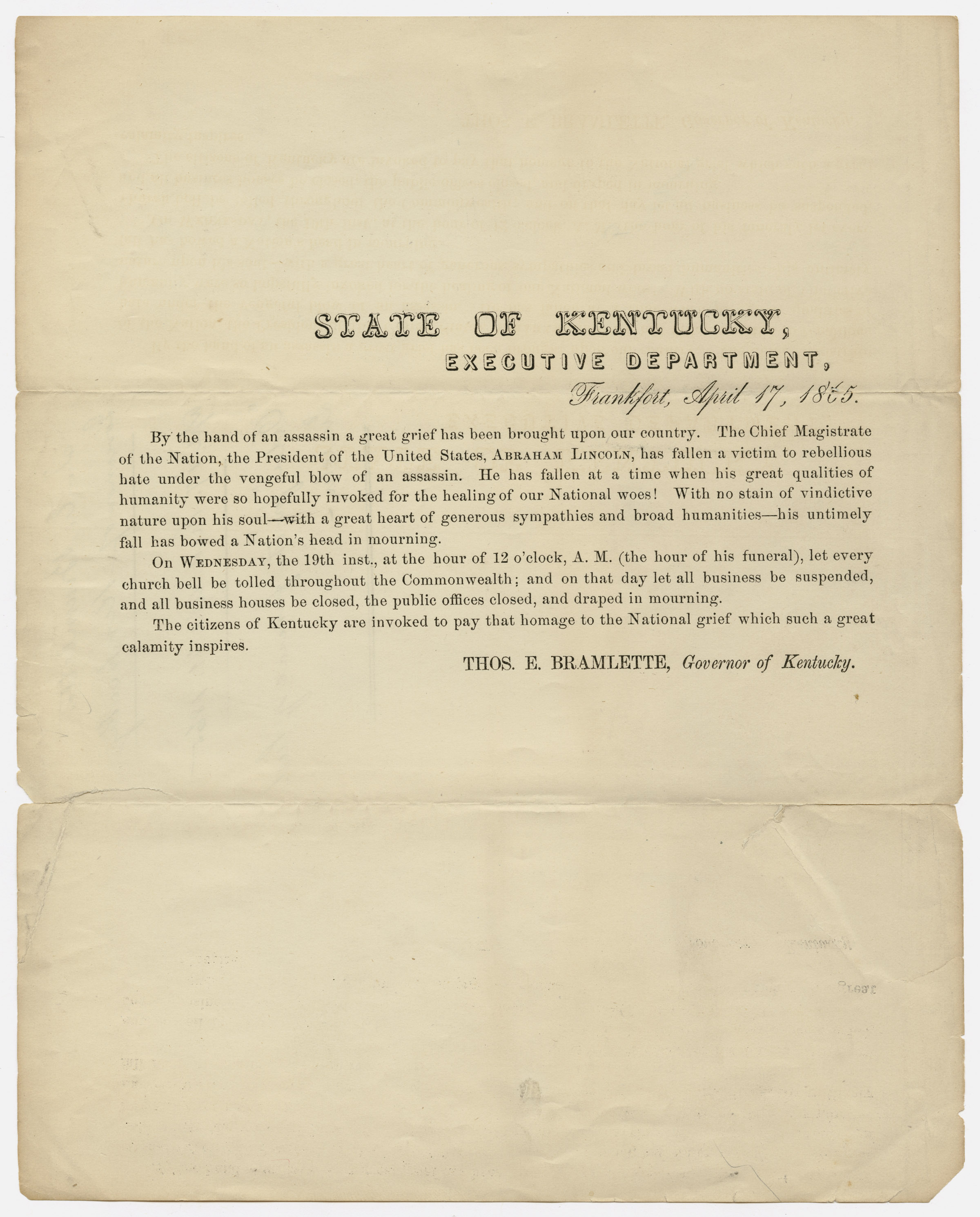
-
Description
Governor Thomas E. Bramlette reacts to the news of Abraham Lincoln's assassination. He also proclaims a day of mourning on April 19th at 12 o'clock for the entire state of Kentucky.
-
Source
U.S. National Archives, General Records of the Department of Justice
-
Rights
This item is in the public domain and may be reproduced and used for any purpose, including research, teaching, private study, publication, broadcast or commercial use, with proper citation and attribution.
-
Creator
Thomas E. Bramlette
-
Date
April 17, 1865
from May. 1, 1865
Dr. Charles A. Leale
-
Full Title
Dr. Charles A. Leale
-
Transcription
The Assassination and Death of Abraham Lincoln, President of the United States
by Chl. A. Leale, Asst. Surgeon US Vol. Executive Officer, Armory Square U.S.A. Hosp[ita]l. Washington D. C.
Having been the first of our profession who arrived to the assistance of our late President, and having been requested by Mrs. Lincoln to do what I could for him I assumed the charge until the Surgeon General and Dr. Stone, his family physician arrived, which was about 20 minutes after we had placed him in bed in the house of Mr. Peterson opposite the theatre, and as I remained with him until his death, I humbly submit the following brief account.
I arrived at Ford's Theatre about 8 1/2 P.M. April 14/65 and procured a seat in the dress circle about 40 feet from the Presidents Box. The play was then progressing and in a few minutes I saw the President, Mrs. Lincoln, Major Rathbone and Miss Harris enter; while proceeding to the Box they were seen by the audience, ^[insert] who cheered [/insert] which was reciprocated by the President and Mrs. Lincoln by a smile and [strikethrough] a [/strikethrough] bow. The party was proceeded by an attendant who ofter opening the door of the box and closing it after they had all entered took a seat near by for himself.
The theatre was well filled and the play of "Our American Cousin" progressed very pleasantly until about half past ten, when the report of a pistol was distinctly heard and about a minute after a man of low stature with black hair and eyes, was seen leaping to the stage, beneath holding in his hand a drawn dagger. While descending his heel got entangled in the American flag, which was hung in front of the box, causing him to stumble when he struck the stage, but with a single bound he regained the use of his limbs and ran to the opposite ^[insert] side [/insert] of the stage, flourishing ^[insert] in his hand a drawn [/insert] [strikethrough] his [/strikethrough] dagger and disappearing behind the scene. I then heard cries that the "President has been murdered", which were followed by those of "Kill the murderer", "Shoot him" etc. which came from different parts of the audience. I immediately ran to the President's box and as soon as the door was opened was admitted and introduced to Mrs. Lincoln, where she exclaimed several times "O Doctor, do what you can for him, do what you can"! I told her we would do all ^[insert] that [/insert] we possibly could.
When I entered the box the ladies were very much excited. Mr. Lincoln was seated in a high backed arm-chair with his head leaning towards his right side supported by Mrs. Lincoln, who was weeping bitterly. Miss Harris was near her left and behind the President.
While approaching the President I sent a gentleman for brandy and another for water. When I reached the President he was in a state of general paralysis, his eyes were closed and he was in a profoundly comatose condition, while his breathing was intermittent and exceedingly stertorous. I placed my finger on his right radial pulse but could perceive no movement of the artery.
As two gentlemen now arrived, I requested them to assist me to place him in a recumbent position, and as I held his head and shoulders, while doing this my hand came in contact with a clot of blood near his left shoulder. Supposing that he had been stabbed there I asked a gentleman to cut his coat and shirt off from that part, to enable me if possible to check the haemorrhage, which I supposed took place from the subclavian artery or some of its branches.
Before they had proceeded as far as the elbow I commenced to examine his head (as no wound near the shoulder was found) and soon passed my finger over a large firm clot of blood, situated about one inch below the superior curved line of the occipital bone and an inch and a half to the left of the median line of the same bone. The coagula I easily removed and passed the little finger of my left hand through the perfectly smooth opening made by the ball and found that it had entered the encephalon. As soon as I removed my finger a slight oozing of blood followed and his breathing became more regular and less stertorous. The brandy and water now arrived and a small quantity was placed in his mouth, which passed into his stomach where it was retained.
Dr. C. S. Taft and Dr. A. F. A. King now arrived and after a moments consultation we agreed to have him removed to the nearest house, which we immediately did, the above named with others assisting. When we arrived at the door of the box, the passage was found to be densely crowded by those who were rushing toward that part of the theatre. I called out twice "Guards clear the passage," which was so soon done that we proceeded without a moments delay with the President and were not in the slightest interrupted until he was placed in bed in the house of Mr. Peterson, opposite the theatre, in less than 20 minutes from the time that he was assassinated. The street in front of the theatre before we had left it was filled with the excited populace, a large number of whom followed us into the house. As soon as we arrived in the room offered to us, we placed the President in bed in a diagonal position; as the bed was too short a part of the foot was removed to enable us to place him in a comfortable position. The windows were opened and at my request a Captain, present made all leave the room except the medical gentlemen and friends. As soon as we placed him in bed we removed his clothes and covered him with blankets. While covering him I found his lower extremities of the ecchymosis until it encircled the orbit extending above the supra orbital ridge and below the infra orbital foramen. The wound was kept open by the Surgeon General by means of ^[insert] a [/insert] silver probe, and as the President was placed diagonally on the bed, his head was supported in its position by Surgeon Crane and Dr. Taft ^[insert] (relieving each other) [/insert]
About 2 A. M. the Hospital Steward, who had been sent for a Nelatons probe, arrived and an examination was made by the Surgeon General, who introduced it to a distance of about 2 1/2 inches, when it came into contact with a foreign substance, which laid across the track of the ball. This being easily passed the probe was introduced several inches further, where it again touched a hard substance, which was at first supposed to be the ball, but as the bulb of the probe on its withdrawal did not indicate the mark of lead, it was generally thought to be another piece of loose bone. The probe was introduced a second time and the ball was supposed to be distinctly felt by the Surgeon General, Surgeon Crane and Dr. Stone. After this second exploration nothing further was done with the wound except to keep the opening free from cogula, which if allowed to form and remain for a very short time, would produce signs of increased compression; the breathing becoming profoundly stertorous and intermittent and the pulse to be more feeble and irregular. His pulse which was several times counted by Dr. Ford and noted by Dr. King, ranged until 12 P. M. from between 40 to 64 beats per minutes, and his respiration about 24 per minute, were loud and stertorous. At 1 A. M. his pulse suddenly increased in frequency to 100 per minute, but soon diminished gradually becoming less feeble until 2:54 A. M. when it was 48 and hardly perceptible. At 6:40 A. M. ^[insert] his [/insert] pulse could not be counted, it being very intermittent, two or three pulsations being felt and followed by an intermission, when not the slightest movement of the artery could be felt. The inspirations now became very short and the expirations very prolonged and labored accompanied by a guttural sound. 6.50 A.M. The respirations cease for some time and all eagerly look at their watches until the profound silence is disturbed by a prolonged inspiration which was soon followed by a sonorous expiration. The Surgeon General now held his finger to the carotid artery, Col. Crane held his head, Dr. Stone, who was sitting on the bed, held his left pulse, and his right pulse was held by myself. At 7.20 A.M. he breathed his last and "the spirit fled to God who gave it."
During the course of the night the room was visited by many of his friends. Mrs. Lincoln with Mrs. Senator Dixon came into the room three of four times during the night. The Presidents son, Captn R. Lincoln, remained with his father during the greater part of the night. Immediately after death had taken place, we all bowed and the Rev Dr. Gurley supplicated to God in behalf of the bereaved family and our afflicted country.
[Stamped: The National Archives of The United States] [Right Margin Vertical Text: D No 776]
True Copy
Chas. A. Leale M.D. -
Source
-
Rights
This item is in the public domain and may be reproduced and used for any purpose, including research, teaching, private study, publication, broadcast or commercial use, with proper citation and attribution.
-
Tags
-
Cite this Item
National Archives. "Dr. Charles A. Leale". War Department. The Adjutant General's Office. Remembering Lincoln. Web. Accessed July 16, 2025. https://rememberinglincoln.fords.org/node/1197
-
Creator
National Archives
-
Publisher
War Department. The Adjutant General's Office
-
Date
1865
from May. 1, 1865
Dr. Charles A. Leale
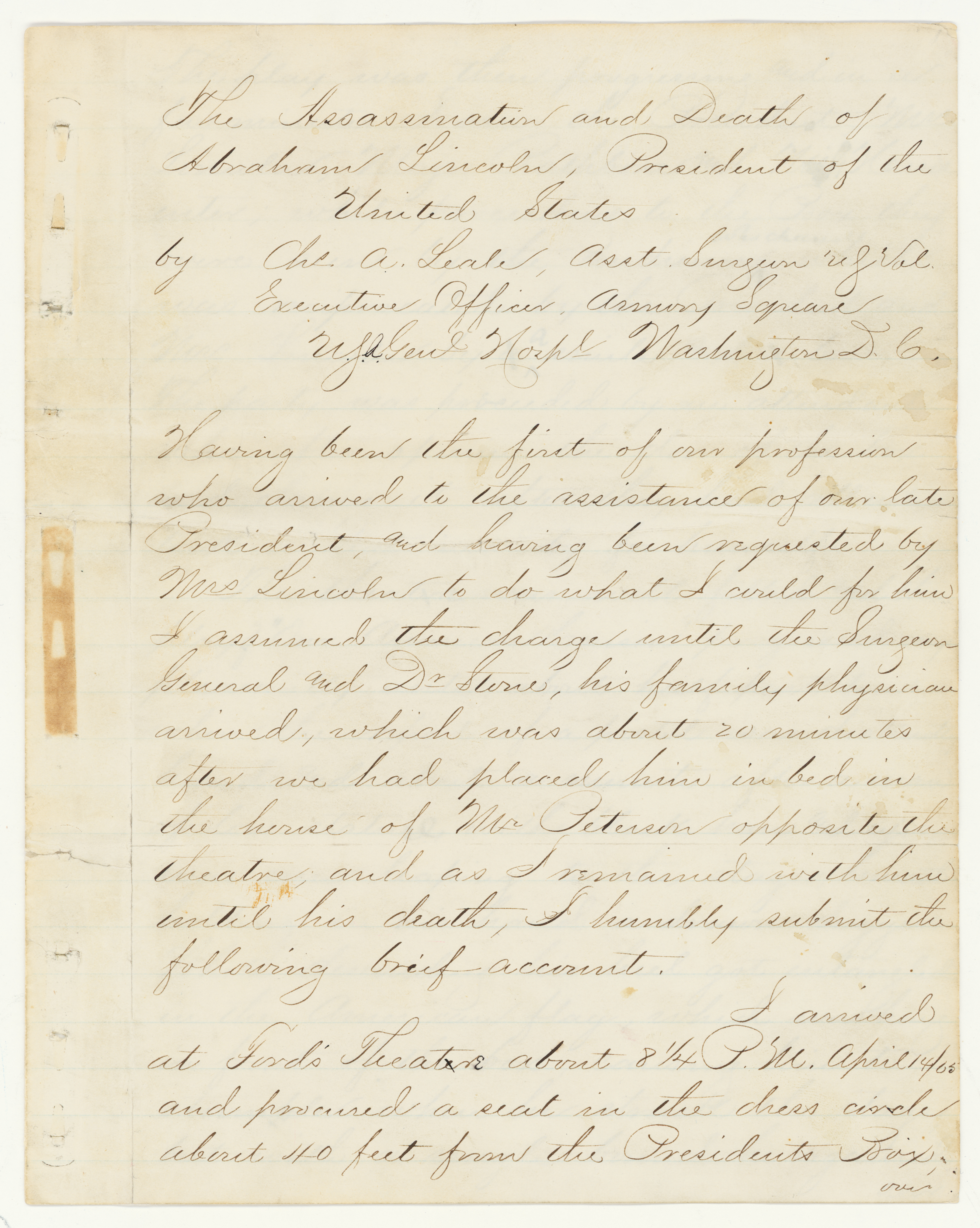
-
Source
-
Rights
This item is in the public domain and may be reproduced and used for any purpose, including research, teaching, private study, publication, broadcast or commercial use, with proper citation and attribution.
-
Creator
National Archives
-
Publisher
War Department. The Adjutant General's Office
-
Date
May 1, 1865
from May. 16, 1865
Dr. Robert King Stone Testimony
-
Full Title
Dr. Robert King Stone Testimony
-
Description
Dr. Robert King Stone was the Lincoln family doctor and one of 350 witnesses to give an account of the events of April 14, 1865. Dr. Stone recounts his experience with the dying Lincoln on the night of the assassination. Stone includes a description of Lincoln's fate and the care he received in his final hours.
-
Transcription
Dr. Robert King Stone,
a witness called for the prosecution, being duly sworn, testified as follows:
By the Judge Advocate
Q. State to the Court if you are a practicing physician in this city?
A. I am.
Q. Were you, or not, the physician of the late President of the United States?
A. I was his family physician.
Q. State whether or not you were called to see him on the evening of his assassination, and the examination which you made and the result?
A. I was sent for by Mrs Lincoln immediately after the assassination. I arrived there in a very few moments and found that the President had been removed form the theatre to the house of a gentleman living directly opposite the theatre, had been carried into the back room of the residence, and was there placed upon a bed. I found a number of gentlemen, citizens, around him, and among others two assistant surgeons of the army who had brought him over from the theatre and had attended to him. They immediately gave over the case to my care, knowing my relations to the family. I proceeded then to examine him, and instantly found that the President had received a gunshot wound in the back part of the left side of his head, into which I carried immediately my finger. I at once informed those around that the case was a hopeless one; that the President would die; that there was no positive limit to the duration of his life; that his vital tenacity was very strong, and he would resist as long as any man could, but that death certainly would soon close the scene. I remained with him doing whatever was in my power, assisted by my friends, to aid him, but of course, nothing could be done, and he died the next morning at about half past seven o'clock. It was about a quarter past ten that I reached him.
Q. He died from that wound?
A. Yes, sir.
Q. Did you extract the ball?
A. Yes, sir. The next day, previous to the process of embalmment, with some medical friends, Dr. Curtis and Dr. Woodward of the Army, and in the presence also of Surgeon General, Dr. Barnes, the examination was made. We traced the wound through the brain, and the ball was found in the anterior part of the same side of the brain, the left side, - a large ball resembling those balls which are shot from the pistol known as the Derringer; an unusually large ball; that is, a larger ball than those used in the ordinary pocket revolvers.
Q. Was is a leaden ball?
A. Yes, sir, a hand made ball, from which the tag on the little end had been cut by hand. The ball was flattened somewhat, impressed in its passage through the skull, and a portion had been cut off in going through the bone. I marked the ball with the initials of the late President, and sealed it in the presence of the Secretary of War in his office, - sealed it with my private seal and endorsed it with my name. The Secretary enclosed it in another envelope which he endorsed in like manner and sealed with his private seal. It is still in his custody, and he ordered it to be placed among the archive of his department.
Q. Was the ball slightly flattened?
A. Yes, sir.
Q. Did you see the pistol?
A. No, sir, I did not. I may state that I marked the ball with the initials of the President, "A, L", so that I could recognize it instantly.
Q. [Exhibiting a ball to the witness.] Look at that ball and tell the Court whether it is the one which you extracted from the head of the President?
A. It is. I recognize the mark I put upon it with my penknife, "A. L", and the shape of the ball. This is the fragment of which I spoke, which was cut off in its passage through the skull. The ball was flattened as I described it to the Court.
[The ball was offered in evidence without objection, and is marked Exhibit No. 30.]
Q. You know nothing in regard to the pistol?
A. No, sir, I never saw it. -
Source
U.S. National Archives, Records of the Office of the Judge Advocate General (Army)
-
Rights
This item is in the public domain and may be reproduced and used for any purpose, including research, teaching, private study, publication, broadcast or commercial use, with proper citation and attribution.
-
Tags
-
Cite this Item
National Archives. "Dr. Robert King Stone Testimony". Remembering Lincoln. Web. Accessed July 16, 2025. https://rememberinglincoln.fords.org/node/1196
-
Creator
National Archives
-
Date
May 16, 1865
from May. 16, 1865
Dr. Robert King Stone Testimony
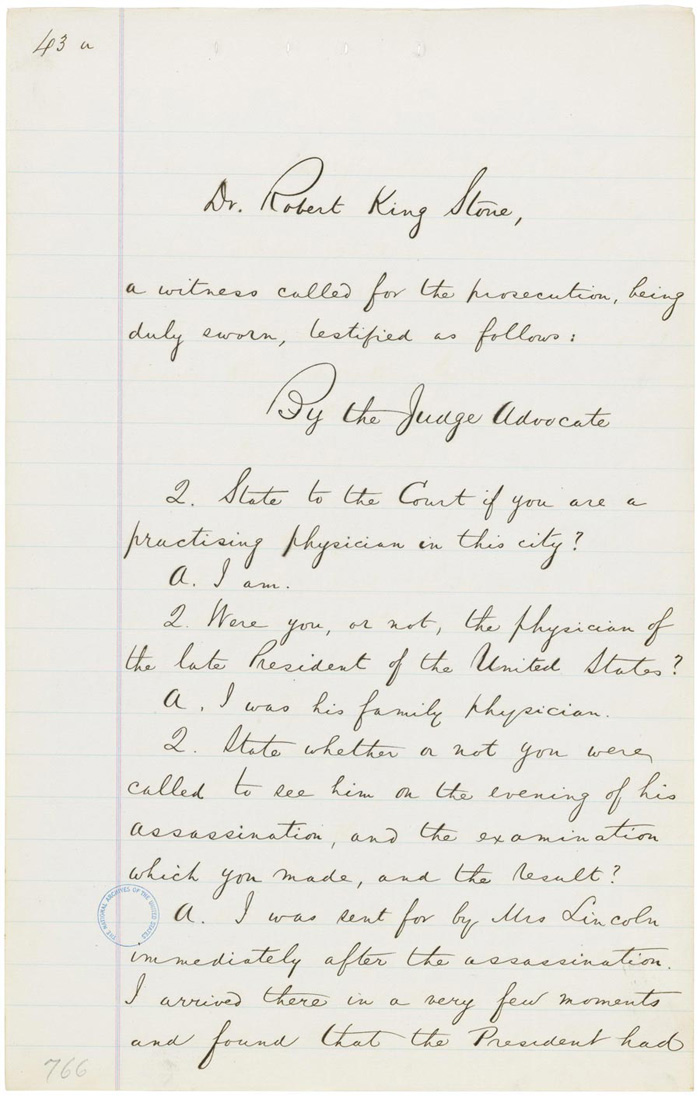
-
Description
Dr. Robert King Stone was the Lincoln family doctor and one of 350 witnesses to give an account of the events of April 14, 1865. Dr. Stone recounts his experience with the dying Lincoln on the night of the assassination. Stone includes a description of Lincoln's fate and the care he received in his final hours.
-
Source
U.S. National Archives, Records of the Office of the Judge Advocate General (Army)
-
Rights
This item is in the public domain and may be reproduced and used for any purpose, including research, teaching, private study, publication, broadcast or commercial use, with proper citation and attribution.
-
Creator
National Archives
-
Date
May 16, 1865
from Apr. 14, 1881
Louisiana's tribute to Abraham Lincoln
-
Full Title
Louisiana's tribute to the memory of Abraham Lincoln, President of the United States : public demonstration in the city of New Orleans, April 22, 1865 ; resolutions, speeches of Christian Roselius and others, etc., etc.
-
Description
Printed in 1881, this book is a complication of reactions to Lincoln's Death from the city of New Orleans.
-
Transcription
[cover:]
Louisiana’s Tribute
To the Memory of
Abraham Lincoln,
President of the United States
Public Demonstration in the City of New Orleans
April 22, 1865
Resolutions, Speeches of Christian Roselius and Others, Etc., Etc.,
Compiled by J. S. Whitaker, Chairman.
New Orleans: Picayune Office Job Print, 66 Camp Street.
1881.
[page 3:]
New Orleans, April 14, 1881
Hon. William E. Shutt, Springfield Ills.:
My Dear Sir, —
When in the summer of 1878, I visited Springfield, one of the chief pleasures I experienced was in passing over places made to certain extent sacred as having been once the home of Abraham Lincoln. You remember how I was struck with the simplicity of his dwelling, and how the recital of many incidents of his noble and unostentatious life as a citizen of Illinois interested me.
With you I finally visited the tomb in your beautiful cemetery, where repose his remains, and while the crypt or chamber in the monument I examined the various records commemorative of the life of our martyred President, and read the eulogiums pronounced upon him in every State and city of this vast nationality he so largely contributed to save.
Among all of these I found no fitting memorial from the State of Louisiana where the news of his terrible taking off by the hands of an assassin produced as much of grief, and of horror, as in any other portion of the Union.
In the following pages taken from “The New Orleans Times,” then conducted by my friend Thomas P. May, Esq., you will find the proceedings by which our people sought to demonstrate our sorrow and their appreciation of our national loss.
By placing these memorials among others in the Monument you will, while conferring a favor on me personally, preserve, what I esteem, an earnest tribute to one of the greatest and noblest characters, that has adorned the annals of our Country
Respectfully, Yours,
J. S. Whitaker
--
We extract the following leading article of the N.O. Times of the morning of 19th, of April, from the pen of Thos. P. May
Assassination of the President and Secretary of State.
The astounding intelligence which it is our painful duty this morning to announce, will paralyze our readers with a sense of unutterable terror, as it must already have paralyzed the mass of the people of the United States. It is difficult to bring the mind to conceive of an atrocity so swift and terrible, unrelenting and devilish. The civilized world will stand shuddering and appalled at the contemplation of so black a deed, and try vainly for words to characterize its utter enormity. The blows struck at President Lincoln and Secretary Seward have gone to the core of the great heart of the nation. The poignant anguish of those fatal wounds penetrate the bosoms of the loyal millions of our country. It seems terrible that the great epoch of a nation’s redemption from a vast and prolonged conspiracy, must needs have been marked by a deed so foul, and a bereavement so afflictive; that the leader of the nation, through its terrible night of civil war, and his chief advisor, must needs have fallen by the hands of assassins before they could witness the fruition of what they have so long, so ardently and ably labored for.
Our heart and hand fail us in the further contemplation of this inexpresibly painful tragedy, for which history furnishes no parallel of enormity.
The country mourns a terrible bereavement. Let us bow in submission to this awful decree of Almighty God, and pray and trust that out of this great affliction good may come to the nation at last.
--
In this Evening’s issue of the Times of the 19th, appeared the following.
The melancholy news of this morning struck every one with horror at the cowardly deed, which has bereaved the Nation of its head and afflicted the people that delighted to do him honor. Seconding the desire of the people the Mayor of the city that once took steps to declare all city business suspended, at the same time that the bells of the city be rung at twelve o’clock, and the official places hung with crape, and such testimonials as would show the sympathy of our people with the Nation in this calamity. The citizens met at Liberty Hall for the purpose of giving expression to their sentiment at this unholy and nefarious deed.
--
Called to Order
Thos. J. Durant arose and stating that the Nation and our people stood aghast at the most appalling crime, suggested the propriety of taking immediate action and nominated Judge Howell, of the Supreme Court, as chairman.
Before taking his seat the Chairman of the meeting confessed that words were inadequate to express his deep horror at this most atrocious and appalling crime. The deepest feelings were those that were inexpressible. The heart of the nation was now throbbing painfully at the misfortune which had befallen the people in the loss of Abraham Lincoln, the President of the United States. He could only hope that in the providence of God, even this calamity might work for good.
The nomination of T.P. May as Secretary of the meeting was accepted unanimously.
--
The Sentiments.
The sentiments of each one of the speakers, of every citizen present, whatever his occupation or his calling, was of the most unfeigned regret as well as horror at the atrocity of the crime. These sentiments were uttered as each one of speakers made suggestions as to the steps which should be taken in the matter. There was no difference of opinion, the only difference being as to the best mode of expressing the feeling of the people.
--
The Results of The Deliberations
After many suggestions as to the place of meeting, after several motions were argued, it was finally concluded that a committee of five be appointed, on whom should devolve all arrangements necessary for the assembly of the citizens on Saturday next. The President appointed on this committee Judge Whitaker, W.T. Gilbert, D. Emely, J.G. Belden, B. Campbell —Judge J.S. Whitaker to act as Chairman.
--
The District Courts Closed
The Judges of the District Courts held a joint session in the rooms of the Second Court, and proposed resolutions concerning the recent calamity. The following is an extract from the minutes of the meeting:
Whereas, The nation is called upon to mourn a great national calamity which has befallen it, in the untimely death of Abraham Lincoln, President of the United States, and William H. Seward, Secretary of State:
Be it resolved, That we, the Judges of the six District Courts of New Orleans, considering it eminently proper as a mark of the high respect and esteem in which the deceased were held, and recognize their many virtues, do adjourn until Monday, the 24th inst.
--
State Offices Ordered to be Closed.
State of Louisiana, Executive Department,
New Orleans, April 19, 1865
owing to the mournful news of the death of the President of the United States and Secretary of State, under circumstances calculated to strike horror to the minds of all good citizens, it is hereby ordered that all offices connected with the State to be closed to-day and to-morrow, the 20th inst.
J. Madison Wells, Governor of Louisiana
--
Action by the First District Court.
At the opening of the First District Court this morning, on motion of the Attorney General, and on suggesting that a telegram announcing the appalling news that two great and illustrious citizens of this Republic—Abraham Lincoln, our honored and immortal President, and our world-renowned Secretary of State, Wm. H. Seward--- have fallen in the plentitude of their fame at the hands of diabolical assassins, on account of the devotion of the said President and Secretary to American liberty and the rights of man, it is ordered, that this court do now adjourn till Thursday (to-morrow) morning, at 10 o’clock, to enable all its officers and employees to take part in the ceremonies of mourning and woe.
--
Action of the Firemen’s Charitable Association.
Fireman’s Charitable Association,
New Orleans, April 19, 1865—12 o’clock
The Fire Department of this city, in view of the sad calamity which has befallen the country in the death of the President of the United States and of the Secretary of State, are requested to suspend the national flag at half-mast from their respective Engine Houses immediately after the publication of this notice.
I.N. Marks, President
Alfred Belanger, Chief Engineer.
--
Action of the Firemen’s Charitable Association
The Firemen’s Charitable Association, as will be noticed by the advertisement, have requested the Fire Department of New Orleans to raise the flag at half-mast over all the Engine Houses, as a mark of sorrow in view of the great national bereavement.
--
The Foreign Consuls
The flags of the offices of the foreign consuls in this city are at half-mast to-day, in appropriate observance of the terrible affliction which has befallen the country.
--
The Customhouse
The various offices of the Customhouse are draped in mourning, and business is suspended
--
The Postoffice
The Postoffice is closed for the day, and preparations are making to drape the exterior of the building in mourning.
--
From the Times of April 20, 1865
The Appearance of the City Yesterday.
The history of New Orleans can furnish few instances of such wide-spread gloom and depression as that exhibited yesterday. The closing of places of business was almost universal, and altogether unprecedented. Considering the short time for preparation, the number of buildings draped with crape was little less than surprising. The display of flags and mourning drapery was too general to admit of particularization. There was scarcely a public office not thus mournfully adorned. Conspicuous among the private residences which were draped were those of Hon. J. Durant and Hon. T. P. May. The Catholic Church on Common Street, and the Charity Hospital, also displayed the emblems of mourning. Col. Saunders & Co., Camp Street, were not behind hand in the general display. The decorations at the National Bank and the United States Treasury Buildings were especially chaste and tasteful.
The public schools were dismissed at an early hour, and thousands of children helped to make up the crowds which thronged the streets.
[transcription by:
Taylor Osborne]
-
Source
Lincoln Financial Foundation Collection via The Internet Archive
-
Rights
This item is in the public domain and may be reproduced and used for any purpose, including research, teaching, private study, publication, broadcast or commercial use, with proper citation and attribution.
-
Tags
-
Cite this Item
J.S. Whitaker. "Louisiana's tribute to the memory of Abraham Lincoln, President of the United States : public demonstration in the city of New Orleans, April 22, 1865 ; resolutions, speeches of Christian Roselius and others, etc., etc.". Picayune Office Job Print. Remembering Lincoln. Web. Accessed July 16, 2025. https://rememberinglincoln.fords.org/node/1192
-
Creator
J.S. Whitaker
-
Publisher
Picayune Office Job Print
-
Date
April 14, 1881
from Apr. 14, 1881
Louisiana's tribute to the memory of Abraham Lincoln, President of the United States : public demonstration in the city of New Orleans, April 22, 1865 ; resolutions, speeches of Christian Roselius and others, etc., etc.
-
Description
Printed in 1881, this book is a complication of reactions to Lincoln's Death from the city of New Orleans.
-
Source
Lincoln Financial Foundation Collection via The Internet Archive
-
Rights
This item is in the public domain and may be reproduced and used for any purpose, including research, teaching, private study, publication, broadcast or commercial use, with proper citation and attribution.
-
Creator
J.S. Whitaker
-
Publisher
Picayune Office Job Print
-
Date
April 14, 1881
from May. 1, 1865
International Expressions of Condolence and Sympathy
-
Full Title
The Assassination of Abraham Lincoln, Late President of the United States of America…Expressions of Condolence and Sympathy Inspired by These Events
-
Description
The U.S. State Department compiled and published a collection of condolences it had received following the Abraham Lincoln's assassination.
-
Source
-
Rights
This item is in the public domain and may be reproduced and used for any purpose, including research, teaching, private study, publication, broadcast or commercial use, with proper citation and attribution.
-
Tags
-
Cite this Item
United States Department of State. "The Assassination of Abraham Lincoln, Late President of the United States of America…Expressions of Condolence and Sympathy Inspired by These Events". U.S. Government Printing Office, . Remembering Lincoln. Web. Accessed July 16, 2025. https://rememberinglincoln.fords.org/node/1191
-
Creator
United States Department of State
-
Publisher
U.S. Government Printing Office,
-
Date
1867
from May. 1, 1865
The Assassination of Abraham Lincoln, Late President of the United States of America…Expressions of Condolence and Sympathy Inspired by These Events
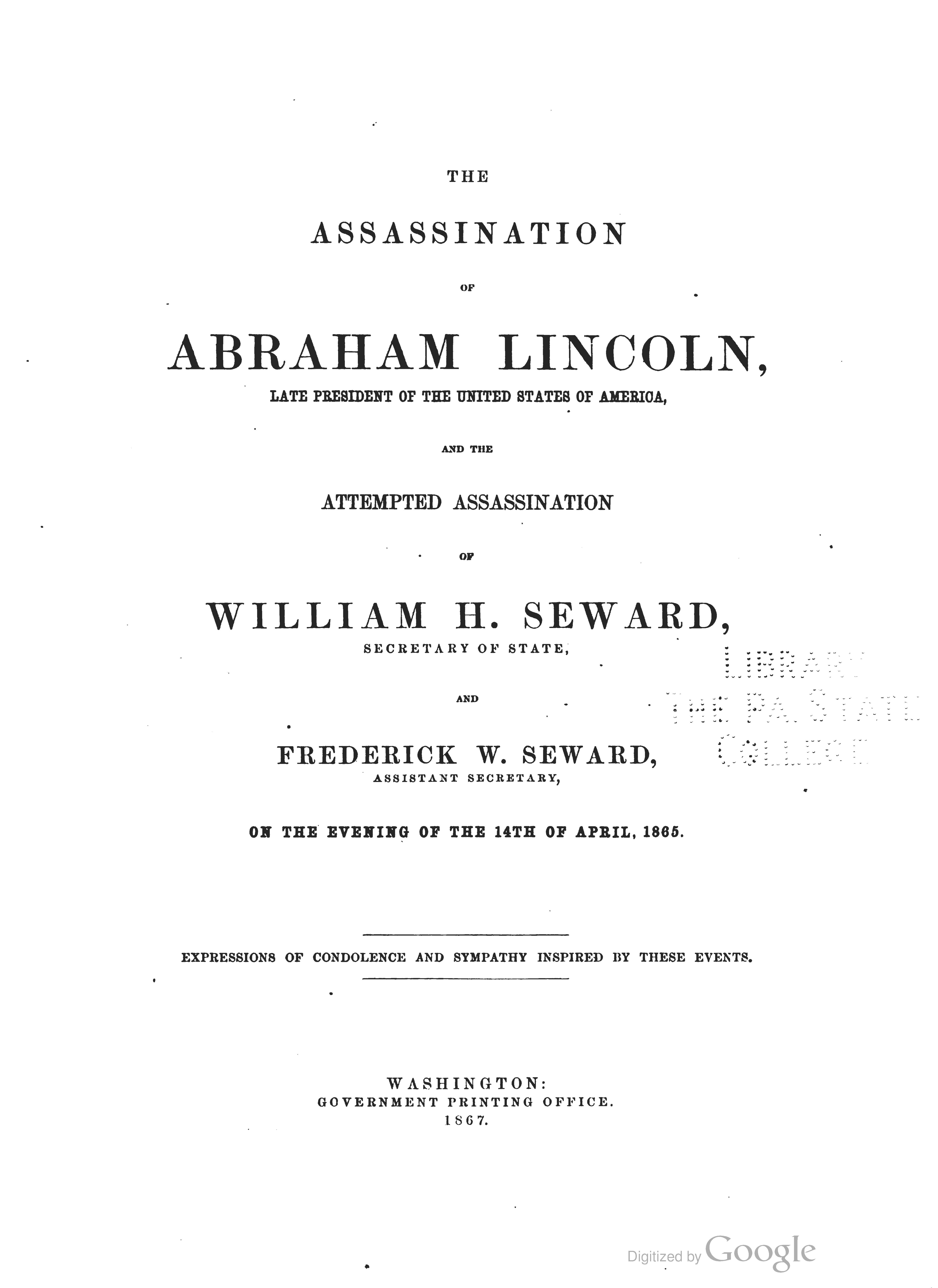
-
Description
The U.S. State Department compiled and published a collection of condolences it had received following the Abraham Lincoln's assassination.
-
Source
-
Rights
This item is in the public domain and may be reproduced and used for any purpose, including research, teaching, private study, publication, broadcast or commercial use, with proper citation and attribution.
-
Creator
United States Department of State
-
Publisher
U.S. Government Printing Office,
-
Date
May 1, 1865
from Apr. 20, 2018
Lincolniana Collection of Katherine Pope
-
Full Title
Lincolniana Collection of Katherine Pope
-
Description
Katherine Pope collected a stories, photographs, and poems from Chicago residents who knew Lincoln.
-
Source
Special Collections Research Center, University of Chicago Library
-
Rights
This item is in the public domain and may be reproduced and used for any purpose, including research, teaching, private study, publication, broadcast or commercial use, with proper citation and attribution.
-
Tags
-
Cite this Item
Katherine Pope. "Lincolniana Collection of Katherine Pope". Remembering Lincoln. Web. Accessed July 16, 2025. https://rememberinglincoln.fords.org/node/1181
-
Creator
Katherine Pope
-
Date
April 20, 2018
from Apr. 20, 2018
Lincolniana Collection of Katherine Pope
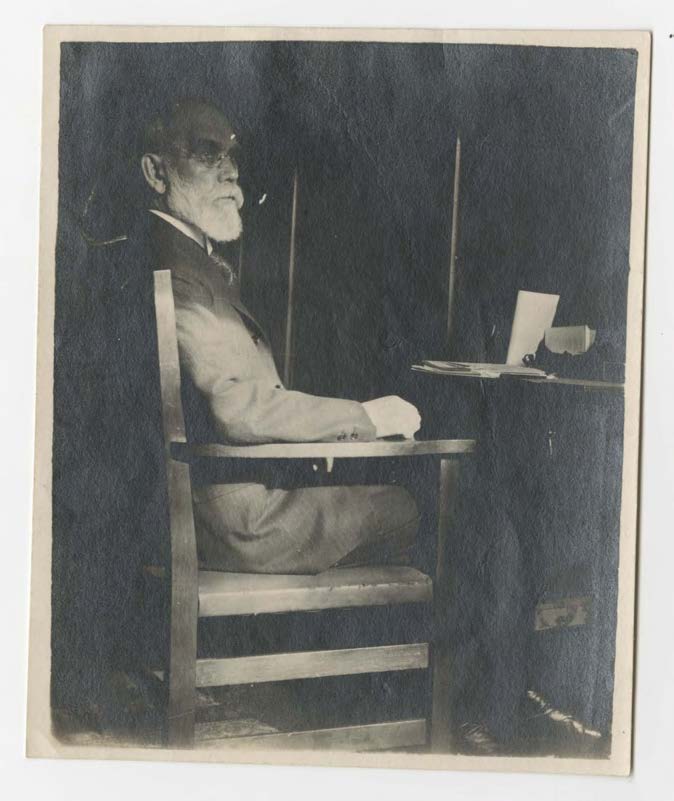
-
Description
Katherine Pope collected a stories, photographs, and poems from Chicago residents who knew Lincoln.
-
Source
Special Collections Research Center, University of Chicago Library
-
Rights
This item is in the public domain and may be reproduced and used for any purpose, including research, teaching, private study, publication, broadcast or commercial use, with proper citation and attribution.
-
Creator
Katherine Pope
-
Date
April 20, 2018
from Apr. 15, 1865
Telegram calling for the arrest of John Wilkes Booth
-
Full Title
Telegram calling for the arrest of John Wilkes Booth
-
Description
A telegram from Col. E.B. Alexander in St. Louis, MO to Capt. Hubbard in Springfield IL calling for the arrest of John Wilkes Booth.
-
Source
Special Collections Research Center, University of Chicago Library
-
Rights
This item is in the public domain and may be reproduced and used for any purpose, including research, teaching, private study, publication, broadcast or commercial use, with proper citation and attribution.
-
Tags
-
Cite this Item
E.B. Alexander. "Telegram calling for the arrest of John Wilkes Booth". Remembering Lincoln. Web. Accessed July 16, 2025. https://rememberinglincoln.fords.org/node/1173
-
Creator
E.B. Alexander
-
Date
April 15, 1865
from Apr. 15, 1865
Telegram calling for the arrest of John Wilkes Booth
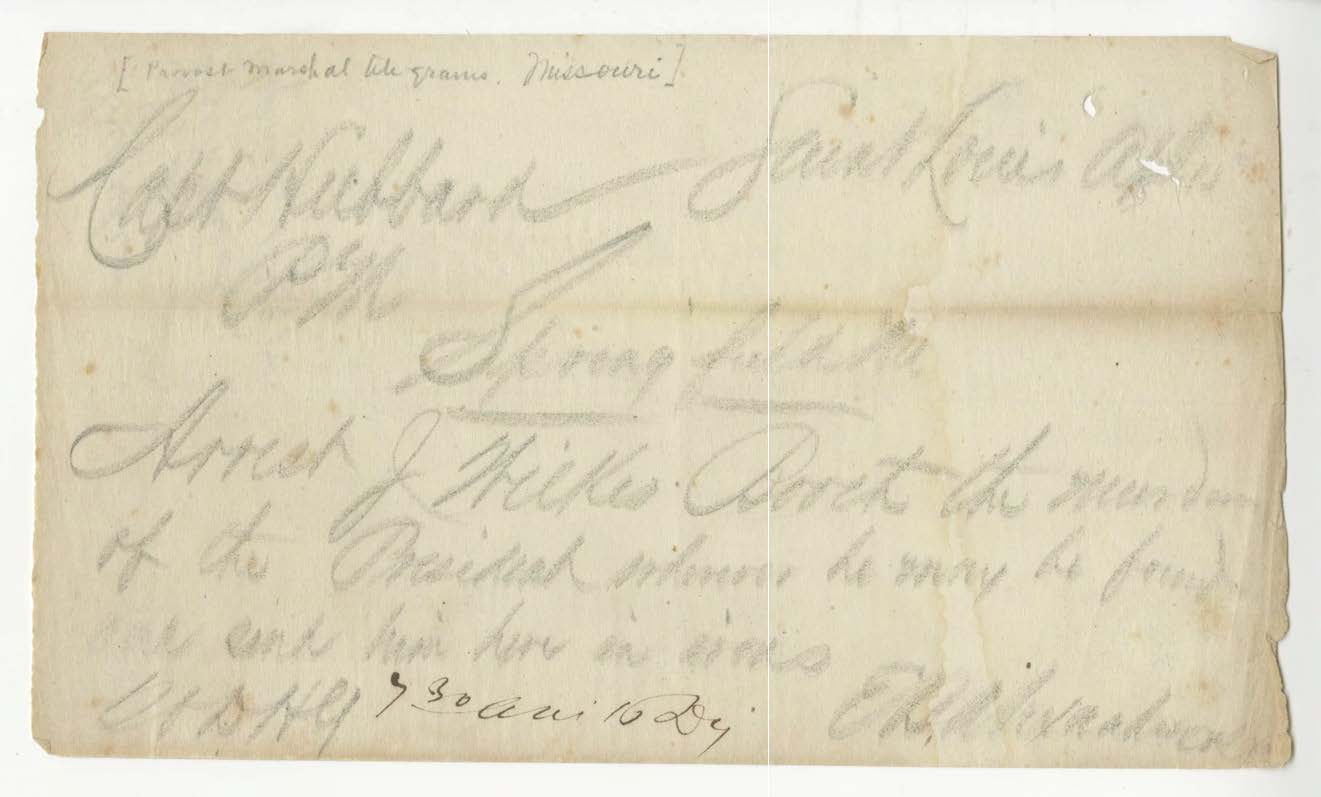
-
Description
A telegram from Col. E.B. Alexander in St. Louis, MO to Capt. Hubbard in Springfield IL calling for the arrest of John Wilkes Booth.
-
Source
Special Collections Research Center, University of Chicago Library
-
Rights
This item is in the public domain and may be reproduced and used for any purpose, including research, teaching, private study, publication, broadcast or commercial use, with proper citation and attribution.
-
Creator
E.B. Alexander
-
Date
April 15, 1865
from May. 1, 1865
When Lilacs Last in the Door-Yard Blooms
-
Full Title
When Lilacs Last in the Door-Yard Bloom'd in the Sequel to Drum-Taps
-
Description
In 1865, Walt Whitman published Drum-Taps, a collections of poems written during the war. A sequel was published the following year, which included Oh Captain! My Captain! and When Lilacs Last in the Door-Yard Bloom'd, both written in response to the Lincoln Assassination. When Lilacs Last in the Door-Yard Bloom'd was written in the form of an elegy during the summer of 1866.
-
Source
-
Rights
This item is in the public domain and may be reproduced and used for any purpose, including research, teaching, private study, publication, broadcast or commercial use, with proper citation and attribution.
-
Tags
-
Cite this Item
Walt Whitman. "When Lilacs Last in the Door-Yard Bloom'd in the Sequel to Drum-Taps". Remembering Lincoln. Web. Accessed July 16, 2025. https://rememberinglincoln.fords.org/node/1172
-
Creator
Walt Whitman
-
Date
Summer 1865
from May. 1, 1865
When Lilacs Last in the Door-Yard Bloom'd in the Sequel to Drum-Taps
-
Description
In 1865, Walt Whitman published Drum-Taps, a collections of poems written during the war. A sequel was published the following year, which included Oh Captain! My Captain! and When Lilacs Last in the Door-Yard Bloom'd, both written in response to the Lincoln Assassination. When Lilacs Last in the Door-Yard Bloom'd was written in the form of an elegy during the summer of 1866.
-
Source
-
Rights
This item is in the public domain and may be reproduced and used for any purpose, including research, teaching, private study, publication, broadcast or commercial use, with proper citation and attribution.
-
Creator
Walt Whitman
-
Date
May 1, 1865
from Jan. 9, 1866
A Speech on "Equality Before the Law"
-
Full Title
A Speech on "Equality Before the Law" Delivered by J. Mercer Langston In the Hall of Representatives in the Capitol of Missouri
-
Description
In this pamphlet put together by the Missouri State Executive Committee, a speech delivered by John Mercer Langston on January 9th, 1866 called for political emancipation for African Americans. Also within this pamphlet, an address by the Colored People of Missouri to the Friends of Equal Rights strived to make manhood, not color, the basis of suffrage and thanked God for using President Lincoln to emancipate African American slaves.
-
Source
-
Rights
This item is in the public domain and may be reproduced and used for any purpose, including research, teaching, private study, publication, broadcast or commercial use, with proper citation and attribution.
-
Tags
-
Cite this Item
Missouri State Executive Committee. "A Speech on "Equality Before the Law" Delivered by J. Mercer Langston In the Hall of Representatives in the Capitol of Missouri". Democrat Book and Job Printing House. Remembering Lincoln. Web. Accessed July 16, 2025. https://rememberinglincoln.fords.org/node/1129
-
Creator
Missouri State Executive Committee
-
Publisher
Democrat Book and Job Printing House
-
Date
January 9, 1866
from Jan. 9, 1866
A Speech on "Equality Before the Law" Delivered by J. Mercer Langston In the Hall of Representatives in the Capitol of Missouri
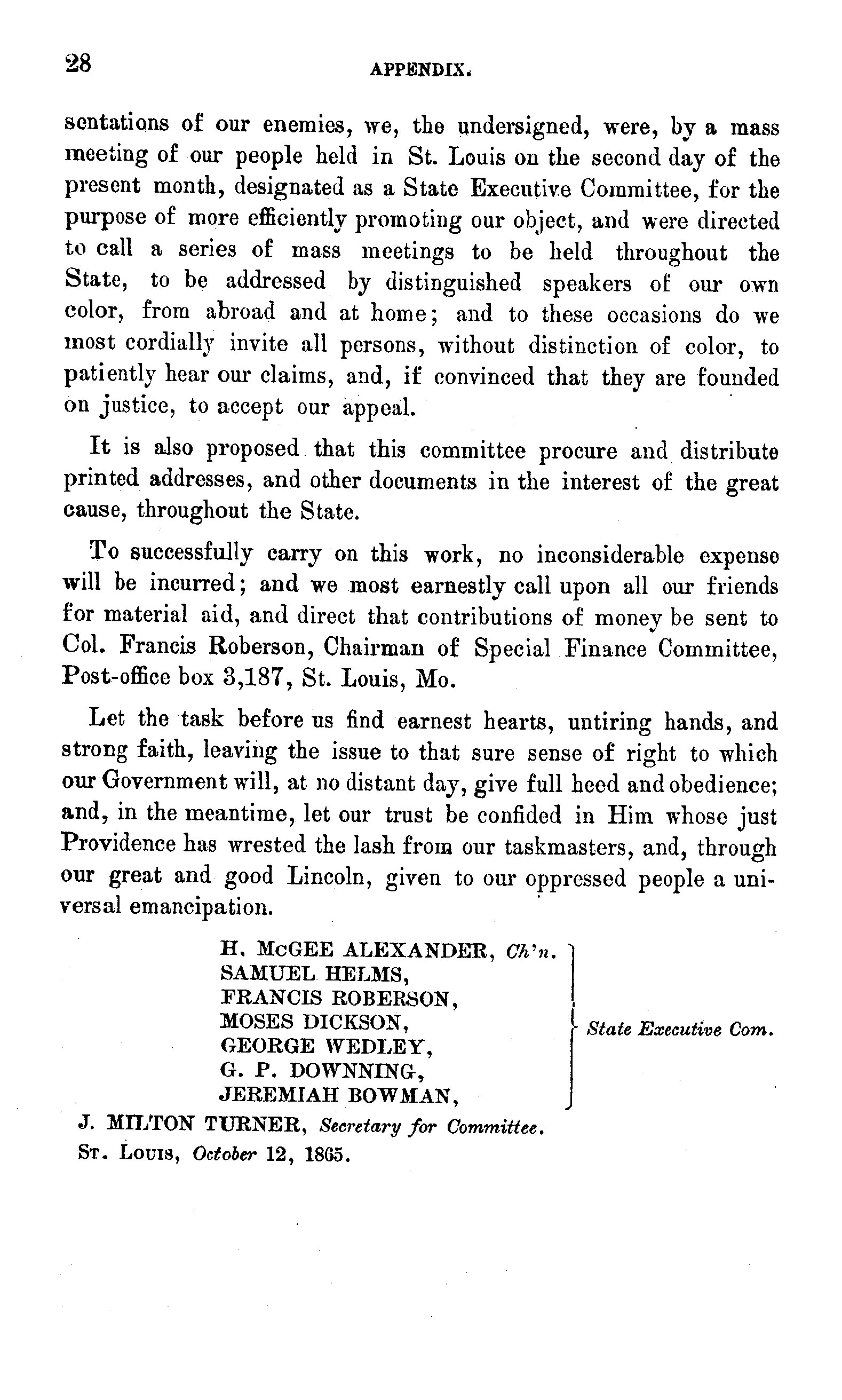
-
Description
In this pamphlet put together by the Missouri State Executive Committee, a speech delivered by John Mercer Langston on January 9th, 1866 called for political emancipation for African Americans. Also within this pamphlet, an address by the Colored People of Missouri to the Friends of Equal Rights strived to make manhood, not color, the basis of suffrage and thanked God for using President Lincoln to emancipate African American slaves.
-
Source
-
Rights
This item is in the public domain and may be reproduced and used for any purpose, including research, teaching, private study, publication, broadcast or commercial use, with proper citation and attribution.
-
Creator
Missouri State Executive Committee
-
Publisher
Democrat Book and Job Printing House
-
Date
January 9, 1866
from Jul. 4, 1865
Colored People's Educational Monument Association Celebration
-
Full Title
Celebration by the Colored People's Educational Monument Association in Memory of Abraham Lincoln
-
Description
On July 4, 1865--the first Independence Day after Lincoln's assassination--the Colored People's Educational Monument Association held a celebration in Washington, D.C., in commemoration of Lincoln, featuring speeches by prominent individuals such as Elder D.W. Anderson, the pastor of Washington's Nineteenth Street Baptist Church, William Howard Day, Senator Henry Wilson of Massachusetts, Senator Michael Hahn of Louisiana, and General Edgar Gregory. The speakers reflected on what the past year's events had meant.
-
Source
-
Rights
This item is in the public domain and may be reproduced and used for any purpose, including research, teaching, private study, publication, broadcast or commercial use, with proper citation and attribution.
-
Tags
-
Cite this Item
Colored People's Educational Monument Association. "Celebration by the Colored People's Educational Monument Association in Memory of Abraham Lincoln". McGill & Witherow. Remembering Lincoln. Web. Accessed July 16, 2025. https://rememberinglincoln.fords.org/node/1128
-
Creator
Colored People's Educational Monument Association
-
Publisher
McGill & Witherow
-
Date
July 4, 1865
from Jul. 4, 1865
Celebration by the Colored People's Educational Monument Association in Memory of Abraham Lincoln
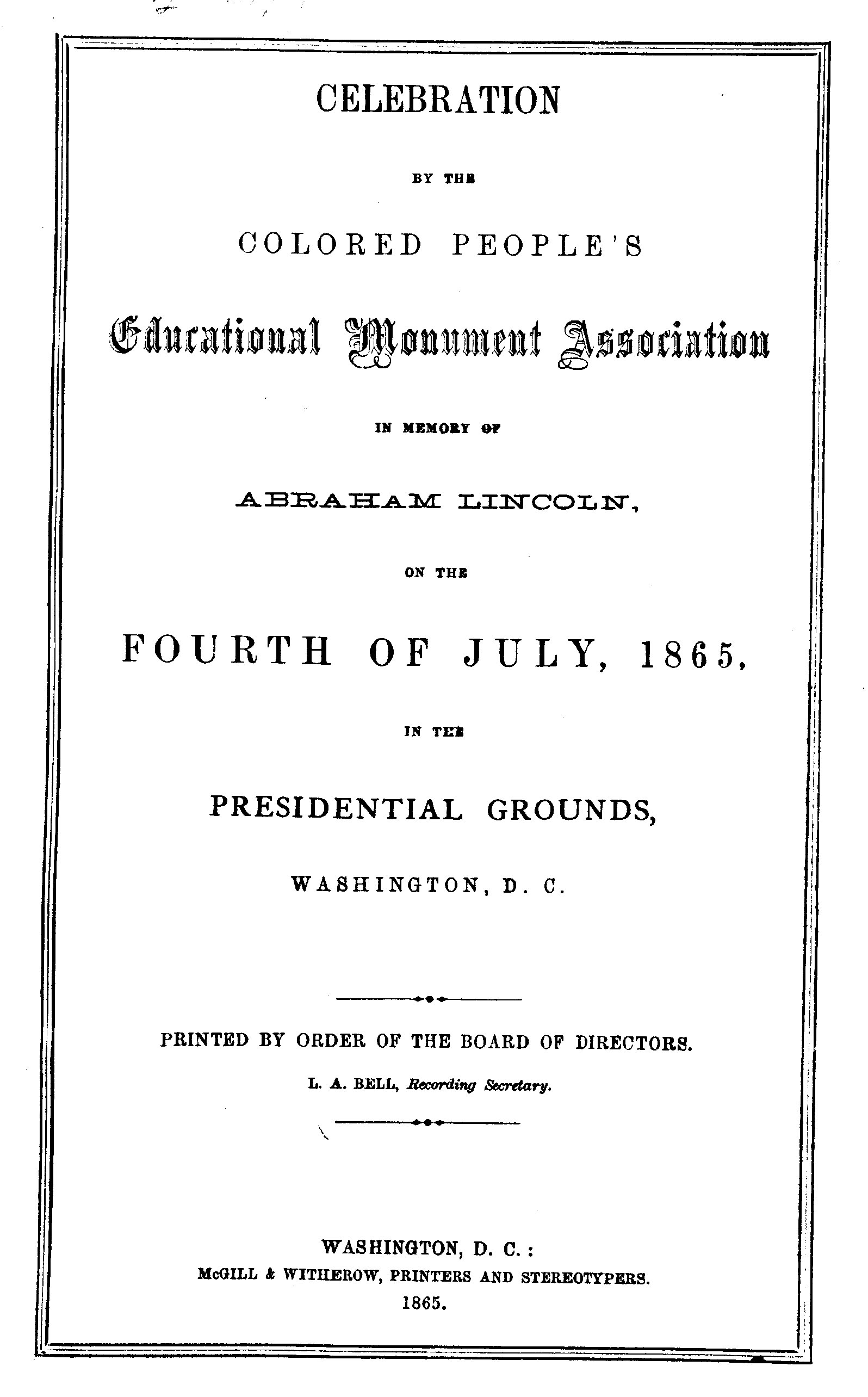
-
Description
On July 4, 1865--the first Independence Day after Lincoln's assassination--the Colored People's Educational Monument Association held a celebration in Washington, D.C., in commemoration of Lincoln, featuring speeches by prominent individuals such as Elder D.W. Anderson, the pastor of Washington's Nineteenth Street Baptist Church, William Howard Day, Senator Henry Wilson of Massachusetts, Senator Michael Hahn of Louisiana, and General Edgar Gregory. The speakers reflected on what the past year's events had meant.
-
Source
-
Rights
This item is in the public domain and may be reproduced and used for any purpose, including research, teaching, private study, publication, broadcast or commercial use, with proper citation and attribution.
-
Creator
Colored People's Educational Monument Association
-
Publisher
McGill & Witherow
-
Date
July 4, 1865